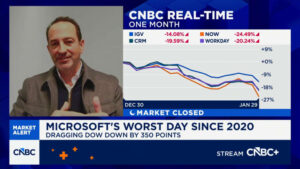In early December 2022, my wife bought Vodafone Group (LSE: VOD) shares for our family portfolio. Including stamp duty and buying commission, we paid 90.2p a share.
At first, this seemed like a good move, as the share price headed above £1 by mid-February. But since then, this FTSE 100 stock has been a flop.
Vodafone bleeds value
At its 52-week high on 20 July 2022, the stock hit 132.04p, but the shares have since plunged. Indeed, they collapsed to bottom out at 71.71p on Tuesday, 13 June. At this point, we were nursing on a paper loss above a fifth (-20.5%) — not my finest deal.
As I write, Vodafone shares have rebounded and stand at 73.25p. This values the global telecoms giant at £19.9bn. This low price still genuinely shocks me, given that this was the largest listed company in Europe at the peak of the dotcom boom in 2000.
Here’s how this stock has performed over seven different timescales:
| One day | +1.1% |
| Five days | -2.4% |
| One month | -18.6% |
| Year to date | -13.1% |
| Six months | -15.2% |
| One year | -41.7% |
| Five years | -60.4% |
Outside of today’s rise, Vodafone’s share price has fallen relentlessly, losing more than two-fifths of its value over one year and over three-fifths in five years. What depressing news for its long-suffering shareholders.
But note that the above figures exclude cash dividends, which account for a major proportion of the long-term returns from owning this stock.
Furthermore, maybe Vodafone stock isn’t the dead duck it seems to be? Perhaps it could be one of my favourite value plays — a FTSE 100 ‘fallen angel’ primed for recovery?
Hot news
One catalyst for a potential share-price recovery came with long-awaited news that finally arrived on 14 June. Vodafone and rival telecoms group and Three UK owner CK Hutchison have agreed to merge their mobile assets into the UK’s largest operator.
If approved, this deal would reduce the number of UK networks from four to three, drawing scrutiny from Britain’s Competition and Markets Authority. Vodafone would own 51% of the new entity, with its Hong Kong-based partner having a 49% stake.
Together, the new business would have 28m customers, making it the UK’s #1 mobile network, ahead of current market leader EE. Were this merger to succeed, it could inject new life into the venture, helping to support the massive investment needed in next-generation 5G mobile networks.
Vodafone shares rebound
When this news broke at 11am on Wednesday, the market response was swift. Vodafone stock surged, peaking at 75.7p, before dropping back to current levels.
Even after recovering from Tuesday’s low, Vodafone shares still look incredibly cheap to me. They trade on a forward price-to-earnings ratio of 7.4, for an earnings yield of 13.5%.
What’s more, their juicy dividend yield of 10.6% a year is one of the highest in the London market.
However, this cash payout is covered only 1.3 times by earnings, leaving little room for error. And I suspect that recently appointed CEO Margherita Della Valle may decide to cut Vodafone’s double-digit dividend to preserve cash and strengthen its debt-heavy balance sheet.
That said, while we don’t have the cash to add more stock right now, Vodafone may well appear on my buy list again in the near future!
This post was originally published on Motley Fool







